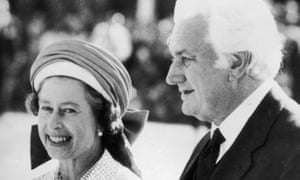‘Dramatic revelations’ expected from 200 exchanges between the Queen, her private secretary and governor general
The imminent release of secret royal correspondence linked to the dismissal of prime minister Gough Whitlam will again call the role of the monarchy in modern Australia into question, experts say.
Australia’s national archives will on Tuesday morning release the much-anticipated “palace letters”, a series of more than 200 exchanges between the Queen, her private secretary, Martin Charteris, and Sir John Kerr, Australia’s then-governor general, in the critical period leading up to Kerr’s hugely controversial dismissal of Gough Whitlam’s Labor government in November 1975.
Kerr’s move to force Whitlam’s reforming leftwing government from office, after the conservative opposition had blocked appropriation bills in the upper house of parliament, remains the most sensational moment in modern Australian politics, leading to years of rancour.
Despite the importance of the letters to Australian history, they
have remained hidden from public view on the faulty rationale that they
were “personal” records, and therefore exempt from the usual 30-year
access rule and under the potentially indefinite embargo of the Queen.Australia’s national archives will on Tuesday morning release the much-anticipated “palace letters”, a series of more than 200 exchanges between the Queen, her private secretary, Martin Charteris, and Sir John Kerr, Australia’s then-governor general, in the critical period leading up to Kerr’s hugely controversial dismissal of Gough Whitlam’s Labor government in November 1975.
Kerr’s move to force Whitlam’s reforming leftwing government from office, after the conservative opposition had blocked appropriation bills in the upper house of parliament, remains the most sensational moment in modern Australian politics, leading to years of rancour.
Historian Jenny Hocking’s landmark case in the high court, after a four-year legal battle, led to the rejection of that argument and forced the archives to reconsider her request for public access.
Speaking ahead of the release of the letters, Hocking said it was impossible to imagine they would contain anything other than “dramatic revelations”.
“We know that there are over 1,000 pages, we know that there are over 200 letters, they are going to be inevitably a series of really dramatic revelations, it’s impossible to imagine otherwise,” Hocking told the Guardian. “They are going to tell us how much detail Kerr gave to the Queen about what he was expecting to do.”
She said other records kept by Kerr – including his 1980 journal – had already pointed to the import of the documents.
The sheer volume of the letters was not known until Hocking took the archives to court to secure their release.
“We had no idea how many letters there were except that it came out as part of the court case, that there are hundreds of these letters, there are 1,200 pages in total in the material we’ll be looking at,” Hocking told the Guardian.
“So an extraordinarily significant, vast holding, I would say the single most important set of documents about the dismissal of the Whitlam government to have been released in the last decade.”
The archives will release the letters at 11am on Tuesday (2am in the UK). The release is expected to comprise six files, made up of 212 letters, including attachments such as “newspaper clippings, reports, and copies of letters related to meetings and events attended by Sir John Kerr during his tenure as governor general”.
The Whitlam dismissal is one of the most contentious episodes in Australia’s political history.
Kerr dismissed without warning an elected government that held a clear parliamentary majority and appointed Malcolm Fraser, the Liberal leader.
Hocking believes the palace letters could reveal what the Queen said, through her secretary, and whether she influenced Kerr’s actions.
“I’m just thrilled, really, that the archives has agreed to open all of the letters in full,” she said.

No comments:
Post a Comment